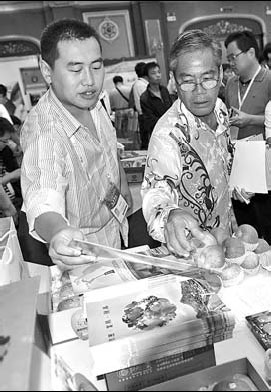Improving Chinese brand awareness in ASEAN markets8
Updated: 2013-05-24 07:26
By Bao Chang (China Daily)
|
||||||||
|
Buyers inspect apples from Shaanxi province at the China-ASEAN expo in Nanning, Guangxi Zhuang autonomous region. Provided to China Daily |
Experts say negative opinions of quality pose 'big obstacle' for exports to major trading partner
China is to strengthen its efforts at improving brand awareness in Association of Southeast Asian Nations markets, a region now considered the country's third-largest trading partner.
"Despite strong bilateral trade ties, some Chinese goods are still regarded as fake or of poor quality in ASEAN markets," said Xu Ningning, executive secretary-general at the China-ASEAN Business Council.
"The unfavorable image has become a big obstacle for the export of those Chinese goods that are actually of high quality to the markets.
"So improving Chinese brand image in ASEAN is a major driver for growing bilateral trade, and the basis of solid economic relations between the two sides."
Xu was speaking at a news conference to showcase trade links between China and ASEAN, at which 60 key products were highlighted, spread across various sectors including food, medicine, construction materials, agricultural products and plastics.
From January to April, bilateral trade was worth $138.97 billion, an 18.1 percent year-on-year increase. China's exports to ASEAN grew 30.6 percent in the period.
"Amid a sluggish global economy, economic cooperation between China and ASEAN is rising and an increasing number of enterprises have expanded in each other's markets," added Xu.
He said efforts to grow awareness of China's most famous brands in ASEAN will strengthen bilateral trade.
China is ASEAN's largest trading partner and biggest export destination, while ASEAN is China's third-largest trading partner and its fourth biggest export destination - strong two-way traffic which has boomed since the conclusion of the China-ASEAN free trade agreement in 2010.
China's trade with Malaysia, its largest single trade partner within ASEAN, has also been growing, with the volume reaching $33.88 billion during the first quarter of this year, a rise of 23.9 percent on the same period last year.
China's Ningxia Light and Textile Industrial Bureau sealed an agreement with Malaysia's East Economic Region in January, to seek investment opportunities in the global Halal food industry.
Ong Chong Yi, minister counselor in economic affairs at the Malaysian embassy in Beijing, said: "China can leverage on Malaysian expertise in Halal certification to expand its market to Muslim countries all over the world, and Malaysia can export more varieties of Halal food products to the Chinese market."
According to Ong, one private Chinese company already plans to establish a Muslim food-transiting center in Malaysia to export more Muslim food to the country and other foreign markets.
baochang@chinadaily.com.cn
(China Daily USA 05/24/2013 page18)

 Michelle lays roses at site along Berlin Wall
Michelle lays roses at site along Berlin Wall
 Historic space lecture in Tiangong-1 commences
Historic space lecture in Tiangong-1 commences
 'Sopranos' Star James Gandolfini dead at 51
'Sopranos' Star James Gandolfini dead at 51
 UN: Number of refugees hits 18-year high
UN: Number of refugees hits 18-year high
 Slide: Jet exercises from aircraft carrier
Slide: Jet exercises from aircraft carrier
 Talks establish fishery hotline
Talks establish fishery hotline
 Foreign buyers eye Chinese drones
Foreign buyers eye Chinese drones
 UN chief hails China's peacekeepers
UN chief hails China's peacekeepers
Most Viewed
Editor's Picks

|

|

|

|

|

|
Today's Top News
Shenzhou X astronaut gives lecture today
US told to reassess duties on Chinese paper
Chinese seek greater share of satellite market
Russia rejects Obama's nuke cut proposal
US immigration bill sees Senate breakthrough
Brazilian cities revoke fare hikes
Moody's warns on China's local govt debt
Air quality in major cities drops in May
US Weekly

|

|








